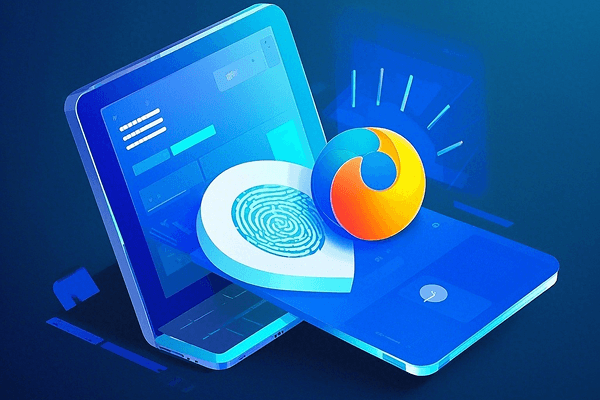
Hot Picks
How to run Facebook ads in 2025? Ideas

Hot Picks
How to promote on Amazon? Sharing various promotion methods

Hot Picks
Choose BitBrowser for fingerprint browsers, and look for the only official website: bitbrowser.cn
Anti-association starts with fingerprinting browser cookies
Time: 2024-12-31 15:58 Click:

Both Firefox and Safari have introduced regulations to limit the use of cookies. Chrome, the world's most popular browser, also plans to disable third-party cookies in the browser by 2024. Cookies still play an important role in identifying users. Cookies are the primary way most websites record login status. Secondly, Cookies are stored in the cloud, enabling remote office and multi-person collaboration.
Have you ever had the feeling that when you turn on your computer or mobile phone, your favorite video will appear in front of you in an instant, and the things you want to buy on your mind will always appear on the screen to tempt you to place an order. You think that the Internet understands you, but in fact it is big data that is studying your every move. When it comes to big data, cookies are unavoidable. Today we will talk about how big data can guess your thoughts through Cookies.
1. What are Cookies?
Cookies is a kind of browser fingerprint identification information, which is temporarily or permanently stored by your computer.
Cookies record login status and solve login authentication problems. When a user logs into a site for the first time, the site pops up with an option to "Keep me logged in for X days" or "Remember me". If you select Yes, visit this site again later to log in, allowing you to remain logged in for a set period of time. Otherwise, you will need to re-enter your account password the next time you log in.
When you open the website from a new network environment and the cookies are still empty, in addition to entering the account password to verify the user's identity and access the account, it will also trigger secondary authentication such as text messages and scan codes to confirm the security of your account access.
Cookies can identify you and record your preferences. Cookies are mainly used to store user login status and record some customer information, access habits and other data. In the early days when the performance of the server and the database was not very strong, many websites chose to put the data that "do not want to be stored on the server" in Cookies and let the client store it. Then, over time, some websites discover the value of this piece of data and transfer it to their servers to record and track this piece of data. When you visit a website using a new network environment, you will first see a pop-up window asking "Do you accept (or agree) our website uses Cookies?" If you choose "I agree", these websites will track and record browser Cookies and related data. Websites read this data to record your identity and determine the information and services they offer.
For example, if you stay on the entertainment, sports, and shopping sections of the website for a long time, the website will judge your favorite entertainment, sports, and shopping sections and record them on the server. The next time you open this website or visit other related websites, we will give priority to display entertainment, sports and shopping pages based on the ID identified by Cookies. Cookies are "trackers" of the user's identity, allowing the website to adjust the push content accordingly from time to time, and continuously recommend content of interest to the user. The most common are affiliate advertisements such as Google and Baidu, which can also recommend advertisements that interest you. To sum up, the main functions of Cookies are:
Allow users to stay logged in for a period of time, enabling websites to record and track users' behavior habits and preferences when browsing the web, and provide unique and interesting information for each user: help companies collect relevant information and help them improve their websites experience.
However, some third-party platforms often push advertisements, which may annoy users, and the leakage of personal privacy information is also a concern of the public. For this reason, both Firefox and Safari have issued relevant regulations on Cookies, and the use of Cookies is restricted. Chrome, the world's most popular browser, also plans to disable third-party cookies in the browser by 2024.
2. The use of Cookies in the field of cross-border e-commerce
Although some browser operators have begun to restrict the use of third-party cookies, at this stage many websites mainly use cookies to identify, record and track users. Cookies still play an important role in identification. So for cross-border sellers who deal with the Internet every day, what problems will website Cookies detection bring? How to solve these problems?
Cookies are an important means to test the openness of browsers.
Cookies are the basic method of checking linked accounts.
If the cross-border seller directly uses a common browser to log in to multiple accounts, the target website will obtain the same set of account IP and cookies, so no matter how many accounts the seller uses, the website is operated by the same person by default.
Even if some sellers use technical means to switch different IPs to access the target website, the website will still find that your IP does not match the cookies, or if the same cookie uses another IP to detect you, it may trigger the account association check.
Can I disable cookies directly?
The answer is no!
For most websites, cookies are the main way to record login status. Disabling cookies in your browser may directly prevent users from being able to log in to the website.
Even if some websites use cookies to save login status, if users do not use cookies for a long time or keep clearing cookies to visit the website for a long time, the risk control of the website may be triggered. At the very least, it will be marked as an "unusual account".
Such "abnormal accounts" may be demoted or banned for other reasons.
3. Create multiple different cookies to prevent account association
The bit fingerprint browser creates a separate cookie for each store, and matches each cookie with store information and store IP one-to-one, so that the store appears as an independent identity. If the e-commerce platform conducts an association check, it is impossible to judge whether the account is associated from the cookies and IP performance.
Cloud synchronization of cookies can achieve login persistence. The bit fingerprint browser can not only create independent cookies, but also realize cloud synchronization of cookies. Allows browsers on different computers to share cookies. This brings many benefits:
First of all, even if you visit the same store across devices, the BitFingerprint browser can maintain the login status of your account through the same cookie to achieve the persistence of the login status. Some accounts usually require mobile phone scanning or verification codes for secondary authentication when logging in. The persistence of the login status of the bit fingerprint browser can effectively reduce the occurrence of secondary authentication and reduce the inconvenience caused by account authentication. In some cases, it may be necessary to log back into your account, but in most cases, a second authentication is not always required.
Secondly, Cookies are stored in the cloud to realize remote office and multi-person collaboration. Users can log in and manage the store without having to work in a stationary environment as long as their cookies are synced locally. Even if multiple people operate the same store at the same time, sharing the same cloud cookies can achieve safe multi-person collaboration.

 Multi-Account Management
Multi-Account Management Prevent Account Association
Prevent Account Association Multi-Employee Management
Multi-Employee Management



